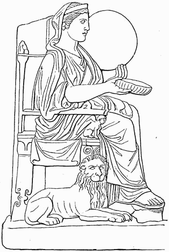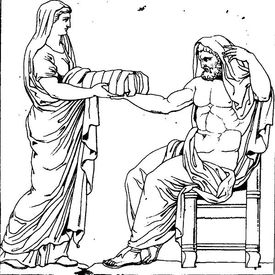THE GODDESS RHEA IN GREEK MYTHOLOGY
The name Rhea is not necessarily one which people might connect with Greek mythology; but in antiquity Rhea was an important goddess. Rhea though, was not a god of the Olympian period, the period of Zeus, but from the preceding Golden Age of Greek Mythology, the time of the Titans.
The Titan Goddess Rhea
 Rhea Wife of Cronus - aus Meyers Konversationslexikon von 1888 - Public Domain
Rhea Wife of Cronus - aus Meyers Konversationslexikon von 1888 - Public Domain
Rhea was the daughter of Ouranus and Gaia, the primordial gods of Sky and Earth. Rhea was therefore a first generation Titan, with 11 siblings. The most famous of these siblings Rhea's brother Cronus, for when the Titans rose up against their father, Cronus would wield the adamantine sickle that castrated Ouranus.
During this act of rebellion, Rhea, along with her sister were not active revels, but afterwards they, along with their brothers, became rulers of the cosmos. Cronus was of course the supreme Titan, and he would take Rhea as his wife. During this period Rhea would become regarded as the Greek goddess of Fertility and Motherhood.
During this act of rebellion, Rhea, along with her sister were not active revels, but afterwards they, along with their brothers, became rulers of the cosmos. Cronus was of course the supreme Titan, and he would take Rhea as his wife. During this period Rhea would become regarded as the Greek goddess of Fertility and Motherhood.
|
|
Rhea Mother of gods
 Rhea Mother of Zeus - Galerie mythologique, tome 1 d'A.L. Millin - PD-life-70
Rhea Mother of Zeus - Galerie mythologique, tome 1 d'A.L. Millin - PD-life-70
As Cronus' wife, Rhea would give birth to his children, six in all, but Cronus was fearful of his position as supreme deity, especially as a prophecy had been foretold of his own overthrown. The prophecy stated that a child of Cronus would rise up against his father.
To circumvent the prophecy, each time Rhea gave birth, Cronus would swallow the baby, imprisoning it within his stomach; and so Demeter, Hades, Hera, Hestia and Poseidon were imprisoned. Zeus would have followed his siblings, but by this time Rhea, was angry with her husband, and so, with the help of Gaia, Zeus was secreted off to Crete.
Rhea would substitute a clothed stone for Zeus, which the oblivious Cronus swallowed. Rhea would then pass the newborn Zeus into the care of some nymphs, including Amalthea, and there in the Dictean Cave on Mount Ida, Zeus was raised. Rhea could not spend time with Zeus for Cronus would have become suspicious.
Eventually, Zeus would return from Crete, and lead an uprising against his father. Rhea would aide him, by giving her husband a potion which forced Cronus to regurgitate the other imprisoned children.
In surviving texts, Rhea is only really mentioned in passing, although the general story sees her go to live on Crete after the Titanomachy, and the island was one of the main places of worship of Rhea in Ancient Greece. That being said temples and sanctuaries could be found across Ancient Greece, for after all, Rhea was mother to the most important gods of the later Greek pantheon.
To circumvent the prophecy, each time Rhea gave birth, Cronus would swallow the baby, imprisoning it within his stomach; and so Demeter, Hades, Hera, Hestia and Poseidon were imprisoned. Zeus would have followed his siblings, but by this time Rhea, was angry with her husband, and so, with the help of Gaia, Zeus was secreted off to Crete.
Rhea would substitute a clothed stone for Zeus, which the oblivious Cronus swallowed. Rhea would then pass the newborn Zeus into the care of some nymphs, including Amalthea, and there in the Dictean Cave on Mount Ida, Zeus was raised. Rhea could not spend time with Zeus for Cronus would have become suspicious.
Eventually, Zeus would return from Crete, and lead an uprising against his father. Rhea would aide him, by giving her husband a potion which forced Cronus to regurgitate the other imprisoned children.
In surviving texts, Rhea is only really mentioned in passing, although the general story sees her go to live on Crete after the Titanomachy, and the island was one of the main places of worship of Rhea in Ancient Greece. That being said temples and sanctuaries could be found across Ancient Greece, for after all, Rhea was mother to the most important gods of the later Greek pantheon.